Most companies still rely on manual onboarding, but AI agents are changing the game. Businesses using automated onboarding tools report 100% higher activation rates and significant time savings. For example, Grubhub’s AI-driven campaigns increased premium sign-ups by 188%, delivering an 836% ROI.
This guide breaks down the 10 best AI agents for onboarding, covering tools like Quidget, Intercom Fin, and Zendesk AI. You’ll see how they handle FAQs, guide users through setup, and integrate with platforms like Slack, Shopify, and Salesforce – all while saving you time and improving customer experiences.
Here’s how these tools work and what makes them stand out.
How to Automate Client Onboarding with AI (Step-by-Step Tutorial)
1. Quidget – AI Agent Builder for Customer Support & Sales
Quidget is an AI agent builder tailored for automating customer onboarding. Developed by SupportYourApp – drawing on over 14 years of expertise in customer support – it’s designed to streamline onboarding with AI-driven automation.
The platform can handle up to 80% of routine questions, ensuring new customers get quick answers during onboarding. Its no-code setup means businesses can upload existing knowledge bases, FAQs, or website content, allowing the AI agent to start responding immediately. For more complex inquiries, the system seamlessly transfers conversations to human agents to maintain service continuity.
Let’s take a closer look at the features that make Quidget a standout choice for onboarding.
Onboarding Features
Quidget tackles common onboarding hurdles with ease. Supporting 45+ languages, it’s an excellent option for companies with global customers. It ensures consistent support across multiple channels, enhancing user experience.
The platform’s web crawler trains the AI directly from your website content, cutting out the need for manual setup. Additionally, pre-built templates for tasks like customer support and lead generation help businesses hit the ground running with tried-and-tested workflows.
Feedback from users highlights these benefits. In June 2024, Karyna N., CEO of an Information Technology and Services company, shared that "the onboarding [was] surprisingly fast" when using Quidget’s integrations. Similarly, Ann K., CEO of a Staffing and Recruiting company, praised Quidget for being "easy to set up and customize".
Integrations
Quidget integrates with over 6,000 apps, including popular tools like Zendesk, Freshdesk, Intercom, WhatsApp, Telegram, Slack, Shopify, WooCommerce, and Calendly. This allows businesses to incorporate AI-powered onboarding without disrupting their existing workflows. For advanced needs, higher-tier plans include API access for custom integrations.
Support Channels
Quidget ensures accessibility by working across websites, mobile apps, and messaging platforms. Customers can reach onboarding support through WhatsApp, Slack, Telegram, and Viber, making it easy to connect through their preferred communication tools.
Pricing (USD)
Quidget offers a range of pricing options to fit different needs:
– Free Plan: 50 responses/month
– Starter Plan: $16/month (or $19/month billed yearly) for 500 responses
– Pro Plan: $79/month (or $99/month yearly) with 10,000 responses and API access
– Pro Plus Plan: $210/month (or $250/month yearly) for 50,000 responses and white-label features
All plans include a 7-day free trial, and annual billing offers a 20% discount.
2. Intercom Fin
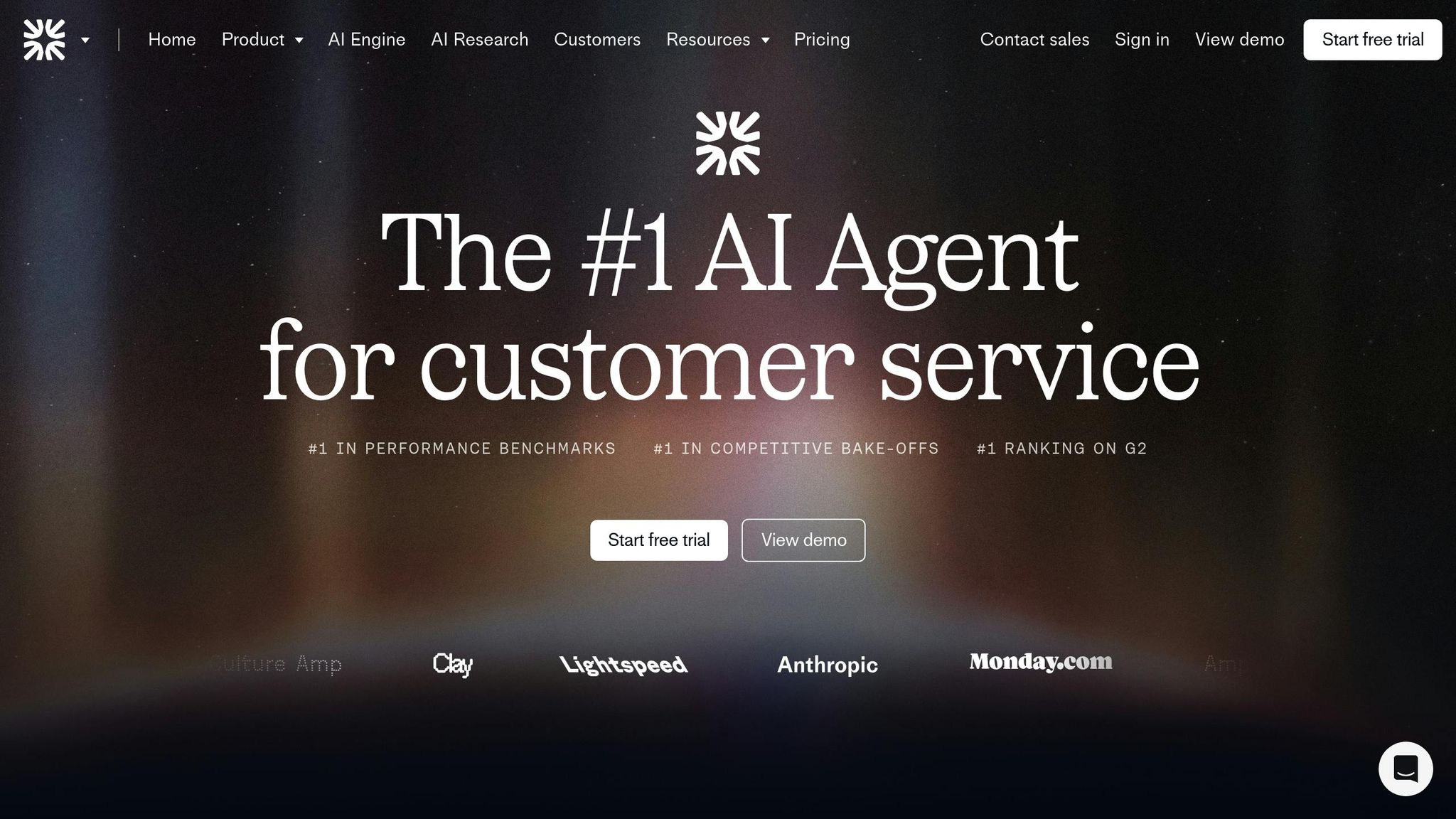
Intercom Fin is an AI-powered chatbot designed to assist with customer conversations, especially during onboarding. Developed by Intercom, it leverages knowledge bases, customer profiles, and past interactions to handle complex queries, automating over half of all support tasks. For example, companies like Hospitable have used Fin to automatically resolve 30% of incoming inquiries. It also keeps conversations flowing smoothly by maintaining context across exchanges.
Onboarding Features
Fin’s onboarding tools are designed to create a better experience for new users. It addresses FAQs, assists with account setup, provides product tours, and even handles minor troubleshooting tasks. Using a visual builder, businesses can easily create interactive guides tailored to specific user needs.
Intercom customers have reported significant improvements in onboarding metrics, with completion rates nearly five times higher compared to previous solutions. Fin sends welcome messages, setup tips, and milestone celebrations automatically, all based on user behavior. Hospitable, for instance, reduced response times by 95%, with 61% of new users favoring the faster AI responses, while also clearing 500 backlogged queries almost instantly.
"Our onboarding completion rate is almost 5x higher than with our previous solution. Onboarding is much more personalized and far more scalable." – Clint Sheets, Customer Experience Specialist
These tools provide a streamlined onboarding process that adapts as businesses grow.
Integrations
Fin connects with over 350 SaaS applications, including Salesforce, Zendesk, Slack, Shopify, HubSpot, Freshworks, and Gorgias. Setup takes less than an hour, and it integrates seamlessly across multiple helpdesk systems. Additionally, the Fin over API feature allows companies to embed the AI directly into their apps as a custom Intercom channel.
Support Channels
Fin works across websites, mobile apps, and messaging platforms, managing tickets, emails, and cases while retaining conversation context. It also supports custom channels, extending its functionality beyond standard web and mobile interfaces.
Pricing (USD)
Intercom Fin offers flexible pricing based on a pay-per-resolution model:
– Fin AI Agent (standalone): $0.99 per resolved conversation (minimum of 50 resolutions per month)
– Fin with Intercom Helpdesk: $0.99 per resolution, plus monthly seat fees:
- Essential: $29 per seat/month
- Advanced: $85 per seat/month
- Expert: $132 per seat/month
– Copilot add-on: $35 per user/month
– Early Stage Program: $65/month (includes 6 full seats, 6 Copilot seats, 20 lite seats, and 300 free Fin resolutions)
Additional charges apply for SMS, WhatsApp, and phone channels based on usage.
3. Drift
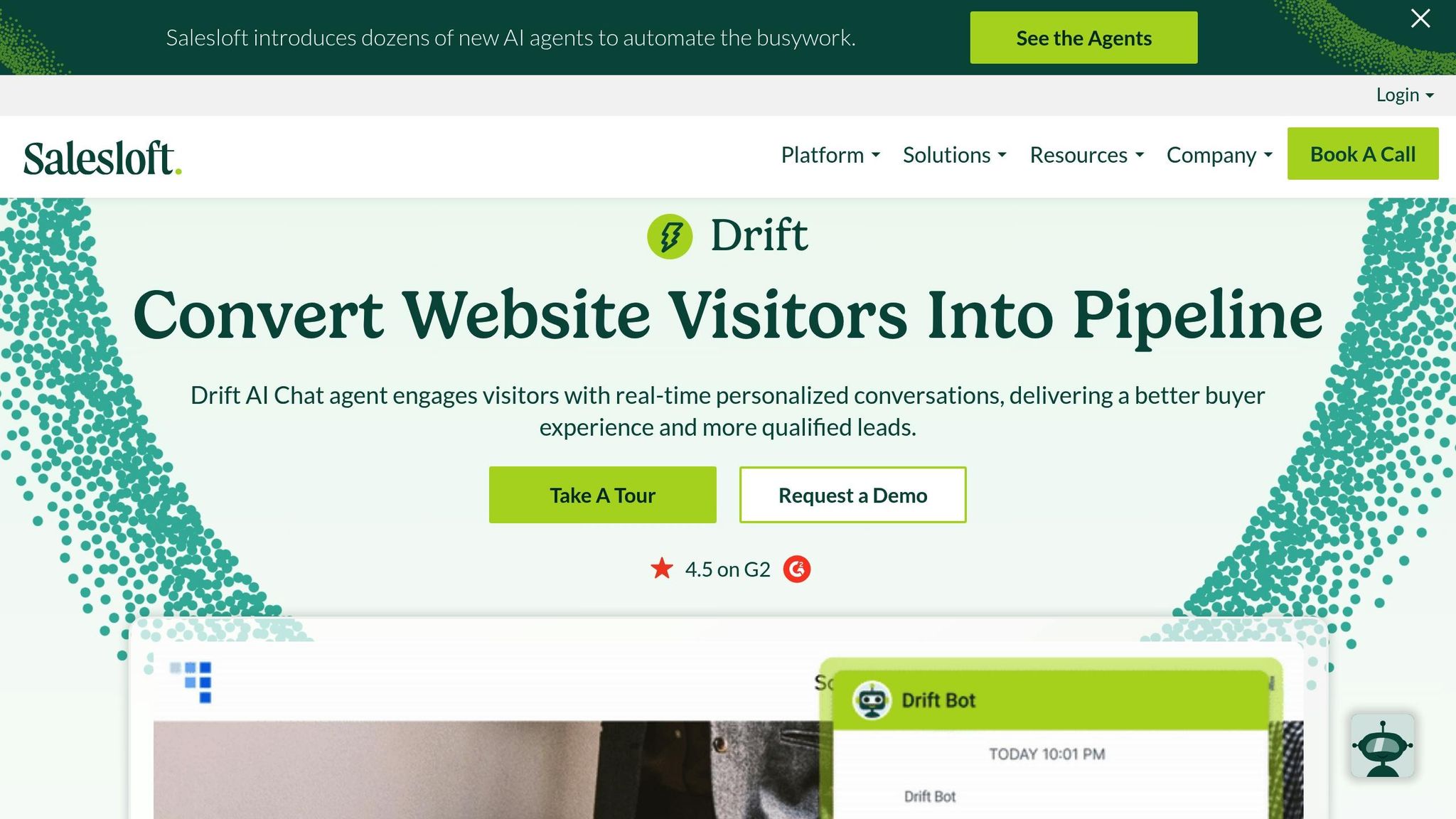
Drift is an AI-driven conversational marketing platform designed to deliver real-time, personalized chat experiences. By leveraging visitor data and account details, it helps B2B companies automate their inbound funnels effectively. Here’s a closer look at its onboarding process, integrations, and pricing structure.
Onboarding Features
Drift provides three onboarding options – Standard, Expedited, and Custom – to fit different business needs. These plans cover everything from account setup and CRM integrations to custom playbook creation and user training.
Their team works closely with businesses to design tailored chat flows, map essential tech attributes, and set up tools like live chat, meeting scheduling, and conversation routing. Support doesn’t stop there – they also offer training and performance reporting throughout the setup and launch phases.
Integrations
Drift connects seamlessly with popular CRM systems, marketing tools, and ticketing platforms. Through its API, businesses can also create custom integrations as needed.
One standout feature is the integration with RollWorks, which uses Drift Personalization Tokens to craft messages based on company name and industry. It also enables routing conversations based on where an account is in its journey. Additional integrations include Outreach, HelpDocs, Segment, and Pendo, which help personalize user interactions, assist trial users, and embed live chat functionality.
Support Channels
Drift’s primary support tool is its website chat interface, offering real-time conversations at various customer touchpoints. Their AI-powered Chat agent works around the clock, engaging visitors, qualifying leads, and routing conversations – even during off-hours. This ensures businesses can capture leads 24/7.
Pricing (USD)
Drift uses a custom pricing model based on business size, required features, and integrations. Annual costs typically fall between $10,000 and $150,000, with smaller businesses spending closer to $10,000–$30,000 per year.
Here’s an overview of their pricing tiers:
– Free Plan: Includes live chat, one agent seat, 100 contacts, basic reporting, and calendar integration.
– Drift for Startups: Tailored pricing for businesses with fewer than 50 employees. Features include unlimited contacts, custom chatbots, proactive messaging, round-robin routing, and revenue reporting.
– Premium Plan: Starts at $2,500 per month (billed annually). Offers custom chatbots, Drift Intel, Salesforce integration, encryption at rest, and Deal Room features.
– Advanced Plan: Adds Drift Fastlane, audience targeting, A/B testing, and advanced lead routing.
– Enterprise Plan: Includes workspace management, multi-language support, AI-powered chatbots, and advanced role-based access controls. Features like direct meeting booking and advanced lead qualification are exclusive to this tier.
4. Ada
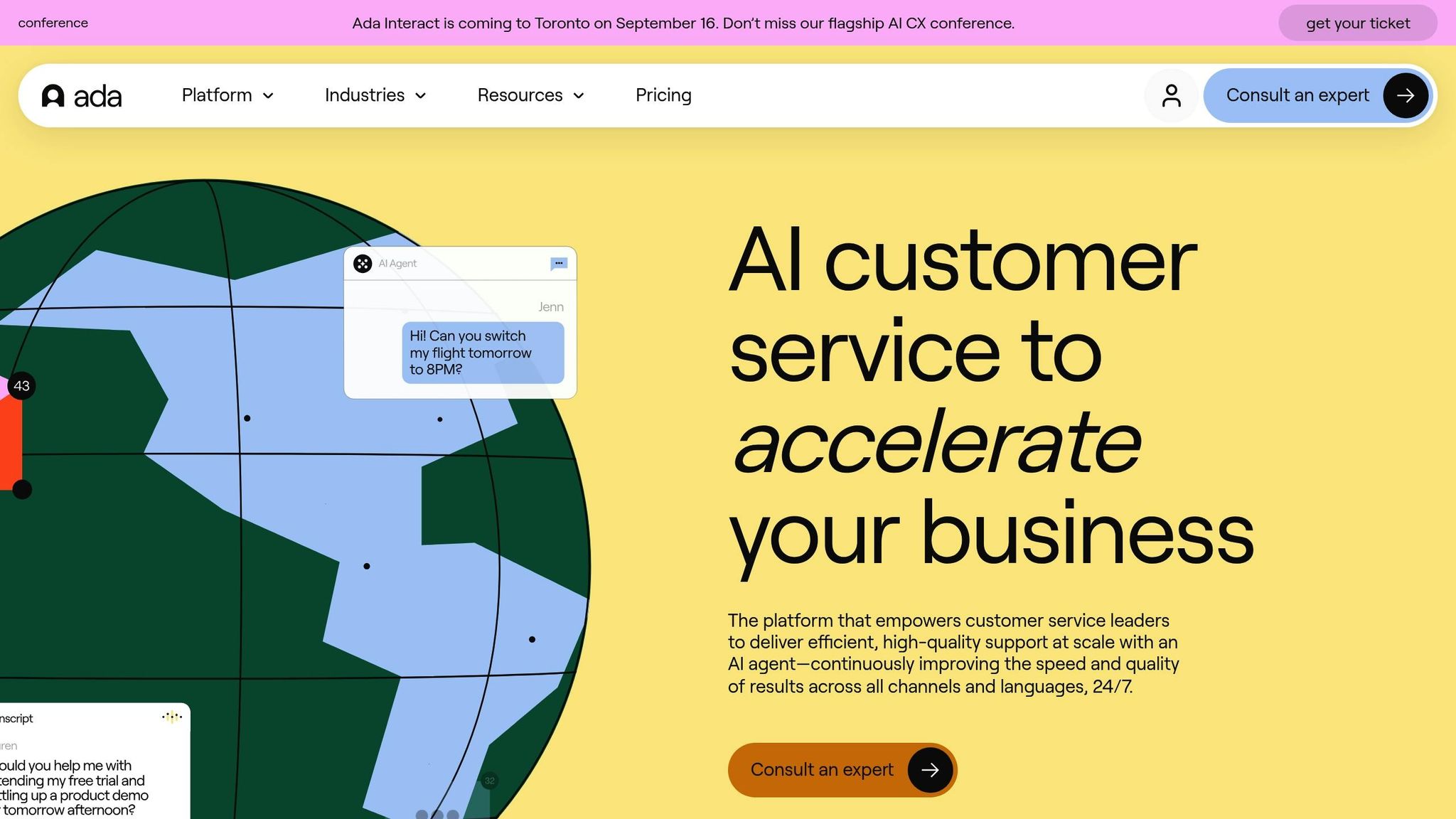
Ada stands out as a platform designed to simplify customer onboarding through smart, automated interactions. With its AI-powered chatbots, Ada handles over 70% of customer questions across multiple channels and languages, making it a go-to tool for businesses aiming to streamline their support processes.
What sets Ada apart is its no-code integration with business systems, which makes it especially appealing for teams looking to build and manage onboarding workflows without technical expertise.
Onboarding Features
Ada’s AI agent takes the lead in automating customer onboarding with conversational workflows and tailored experiences. It guides users through essential steps like setup, data collection, and feature discovery, while also managing repetitive tasks such as welcome messages, account verification, and product tours. What’s more, Ada’s AI adapts over time, learning from user interactions to offer increasingly tailored guidance based on individual preferences and behaviors.
A standout example of this is Impala, which saw a 100% increase in user activation thanks to Ada’s automated interactive walkthroughs.
Integrations
Ada integrates seamlessly with a wide variety of business tools, making it highly versatile. For e-commerce, it connects with platforms like Lazada, Shopee, TikTok, Shopify, and Tokopedia. In knowledge management, Ada syncs with systems such as Zendesk, allowing it to pull relevant support content directly into customer conversations. Additionally, its integration with Contentful creates a feedback loop where customer interactions inform content updates, continuously improving the quality of support materials.
One digital-first fashion retailer saw impressive results after integrating Ada, including a 5x increase in revenue, a 20% reduction in manual tasks, and a 90% cut in working capital blockage.
Support Channels
Ada ensures a consistent customer experience across multiple communication channels. Its AI agent operates seamlessly on web chat, mobile apps, social media platforms, and email, maintaining context across interactions. For instance, if a customer starts a conversation on a website and later continues via email, Ada remembers the previous discussion, ensuring continuity.
Pricing (USD)
Ada’s pricing is tailored to meet the needs of businesses of various sizes, with costs ranging from $4,000 to $64,000 annually. For highly customized implementations, pricing can go as high as $259,516 per year. On average, most buyers spend around $70,001 annually, placing Ada firmly in the premium pricing category. Monthly pricing starts at approximately $5,000 for basic setups.
For businesses looking to save, platforms like Vendr report that companies can negotiate an average savings of 17% on their Ada subscriptions.
5. Tidio
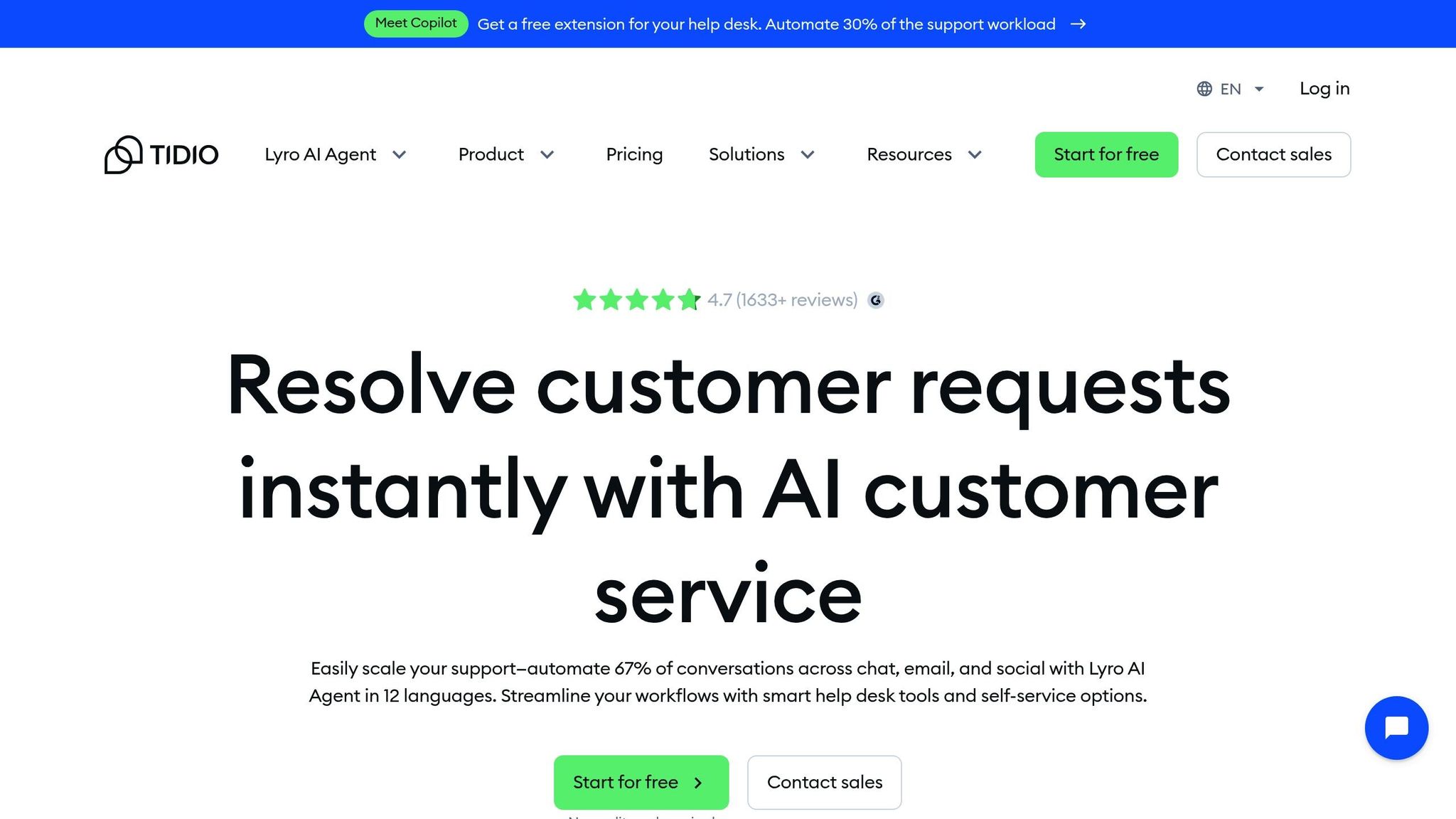
Tidio brings together live chat, chatbots, and email automation to help businesses guide customers from their first interaction to product adoption.
By tracking customer behavior, Tidio segments users and triggers targeted email campaigns based on their actions.
Onboarding Features
Tidio’s onboarding process starts with personalized welcome emails, which see 2-3x higher open rates. These emails include step-by-step guides and introductions to team members – like Head of Customer Support Olek – to make new users feel supported right away.
The onboarding sequence continues with nudge emails that highlight success stories, special offers, and reasons to stay engaged with the product. Including offers in these emails can increase revenue by 30%, making them a smart choice for businesses focused on conversions.
To ease users into the platform, Tidio includes an FAQ chatbot. This tool allows users to get comfortable with the product at their own pace, avoiding the overwhelm of too much information all at once. Additionally, conversational landing pages let businesses connect with new users through real-time chats, answering questions during those crucial first moments of interaction.
These features are further supported by integrations that simplify the onboarding process.
Integrations
Tidio connects seamlessly with various tools to enhance functionality:
– Shopify: Manage customer details, orders, and FAQs.
– Mailchimp: Automatically sync contacts and segment audiences for targeted email campaigns.
– Slack: Keep teams updated with real-time notifications.
– Google Analytics: Track chat interactions and pinpoint areas where users might struggle during onboarding.
Through Zapier, Tidio integrates with over 1,000 apps, enabling custom workflows to automate onboarding tasks. For example, the ClickUp integration creates tasks for new contacts captured by Tidio’s chatbots. Premium plan users can access nearly any app integration with help from Tidio’s implementation specialists.
Support Channels
Tidio provides multiple ways for businesses to engage with customers. The platform supports web chat, Facebook Messenger, and email, ensuring conversation context is preserved across channels.
The Facebook Messenger integration enables businesses to automate responses, engage directly with users, and personalize interactions based on previous conversations. This multi-channel approach allows customers to start their onboarding journey on one platform and continue on another without losing progress or needing to repeat themselves.
Pricing (USD)
Tidio offers a Free Plan with 50 live chat and 50 Lyro AI conversations each month, covering up to 100 visitors.
For more advanced features, Tidio’s paid plans include:
– Starter Plan: $24.17/month (billed annually), offering 100 billable conversations and basic analytics.
– Growth Plan: $49.17/month (billed annually), supporting up to 2,000 conversations with advanced analytics and custom branding options.
– Plus Plan: Starting at $749/month, this plan includes custom conversation quotas and premium support.
– Premium Plan: Starting at $2,999/month, it provides unlimited conversations and guarantees a 50% AI resolution rate.
Additional features are available as optional add-ons. The Lyro AI Agent starts at $39/month for 50 conversations, while Flows begins at $29/month for 2,000 unique visitors. This flexible pricing structure allows businesses to tailor their plans to their needs and scale as they grow.
6. Chatfuel
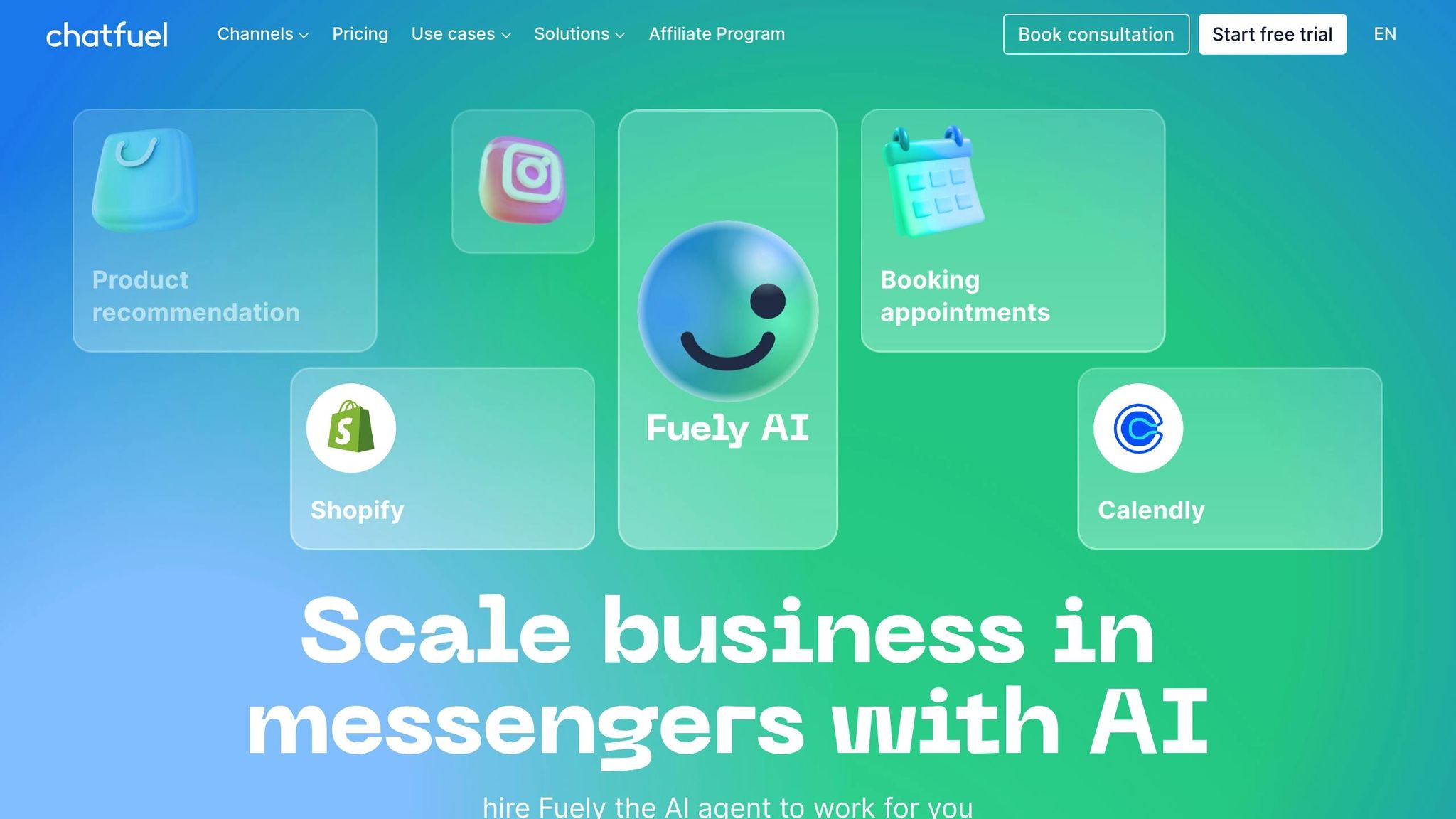
Chatfuel is a no-code chatbot builder designed to create tailored onboarding experiences across platforms like Facebook Messenger, Instagram, WhatsApp, and websites. By automating routine questions and guiding new users, it simplifies the onboarding process. Chatfuel uses data from users’ Facebook profiles and past interactions to craft personalized welcome flows.
Onboarding Features
With its Flow Builder, Chatfuel creates step-by-step onboarding sequences to introduce users to your product. It handles unlimited conversations and can address up to 80% of common user inquiries. The platform supports multimedia content, making the onboarding experience more interactive. Built-in analytics help teams monitor user engagement and quickly identify areas for improvement. If users need further assistance, Chatfuel can seamlessly switch from automated responses to live chat, connecting them with human support when required.
Integrations
As an official Meta partner, Chatfuel integrates with Facebook Messenger, Instagram, WhatsApp, and a variety of tools like Stripe, Calendly, Shopify, and HubSpot. Through Zapier and its API, it connects to over 2,000 applications, enabling businesses to manage onboarding tasks across their entire tech stack. These integrations allow for a smooth experience as users transition between channels.
Support Channels
Chatfuel operates across four major platforms – Facebook Messenger, Instagram, WhatsApp, and websites. This means users can start their onboarding journey on one platform and continue on another without losing any context, ensuring a consistent experience.
Pricing (USD)
Chatfuel’s pricing is based on the number of monthly conversations:
– Business plan (Facebook and Instagram): Starts at $23.99/month for 1,000 conversations, with additional conversations priced at $0.02 each.
– Business plan (WhatsApp): Starts at $34.49/month for 1,000 conversations.
– Enterprise plan: Starts at $300/month and includes priority support, a dedicated bot builder specialist, a personal account manager, and 10 free bot-building hours.
The platform has received positive feedback from users, earning a 4.5/5 rating on G2 and 4.3/5 on Capterra.
sbb-itb-58cc2bf
7. Lyro
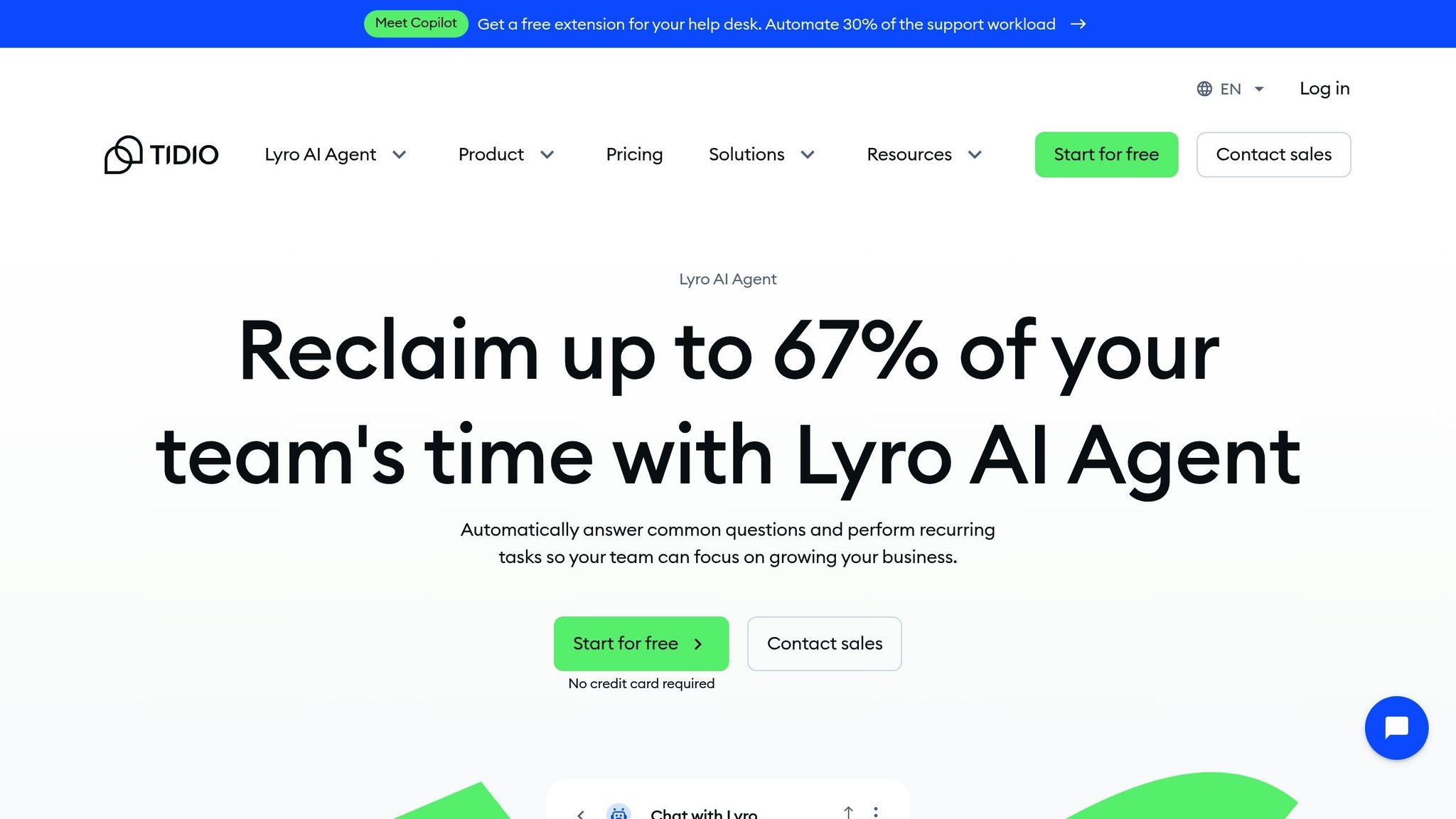
Lyro is Tidio’s AI-powered agent designed to simplify customer support across various channels. It handles interactions via chat, email, and social media, while continuously learning from your existing knowledge base. Beyond basic queries, Lyro can tackle more advanced tasks like managing accounts and processing refunds – all without needing human assistance.
It integrates seamlessly with your help desk, leveraging FAQs and knowledge base articles to deliver precise responses. For more complex situations, Lyro ensures a smooth handoff to human agents through Tidio or other help desk platforms.
Onboarding Features
Lyro is particularly effective at automating the onboarding process, resolving 67% of support requests on its own. With every interaction, it refines its understanding, improving how it supports new users.
The platform also provides analytics to help teams monitor performance and detect patterns during onboarding. These insights allow businesses to identify common issues and refine their processes. In addition to guiding new users, Lyro can handle tasks like updating orders, managing accounts, and issuing refunds.
"At present, about 90% of conversations are handled by Lyro, and in the vast majority of cases the responses have been perfect." – Max Sealey, Support Services Manager @ Gecko Hospitality
Marketing Director Jackelyn Dacanay from Bella Santé shares, "I love the data and I love the self-learning kind of aspect of Lyro. We’ve been able to pull hundreds of questions from our FAQ and continue to have Lyro learn from that information."
Integrations
Lyro extends its capabilities through Lyro Connect, included with Plus and Premium plans. It also integrates with Zapier, enabling connections to tools like accounting apps for automated documentation and real-time updates.
These integrations reduce manual errors and ensure accurate data syncing across your systems. Lyro can connect with document-sharing platforms, accounting tools, and practice management systems – further enhancing its ability to streamline onboarding and improve workflows.
Support Channels
Lyro keeps track of conversation history across all your support channels. This means users can start their onboarding journey on one platform and continue seamlessly on another, with all prior interactions preserved.
Pricing (USD)
Lyro offers a conversation-based pricing structure with flexible tiers:
– Free plan: Includes 50 Lyro conversations (one-time allotment, no monthly refresh)
– Lyro AI Agent add-on: Starts at $39/month for 50 conversations
– 100 conversations: $75/month
– 150 conversations: $110/month
– 200 conversations: $140/month
– Lyro Connect: Available with Plus and Premium subscriptions, with conversations starting at $0.50 each
For businesses with higher needs, custom conversation limits can be arranged by contacting the sales team. Lyro has received high praise from users, earning a 4.6/5 rating on G2 (600+ reviews) and 4.7/5 on Capterra (470+ reviews).
8. Zendesk AI
Zendesk AI simplifies customer onboarding by leveraging insights from billions of interactions to create tailored experiences right from the start. It identifies the best onboarding paths for each individual, enabling teams to customize their approach and accelerate the time it takes for customers to see value.
Its autonomous bots and digital assistants handle FAQs and guide users through onboarding, delivering instant support. Let’s dive into its standout onboarding features, integrations, and support options.
Onboarding Features
Zendesk AI keeps tabs on onboarding progress in real time, spotting potential issues before they snowball. This allows customer success teams to step in early, strengthening relationships and ensuring a smoother journey.
The platform’s AI-driven knowledge base suggests helpful content and links directly to the help center, making life easier for support agents. In fact, 51% of customers prefer interacting with bots for immediate service, which aligns with Zendesk’s focus on automation.
Zendesk AI also automates workflows and sends notifications based on customer behavior. By pulling data from communication channels like social media, websites, and email, it offers a unified view of the customer journey, making it easier to track and manage interactions.
"Success members accompany the customer on their journey and stick around for the entire life cycle. We’re here to provide recommendations for how Zendesk products can best align with our customers’ short-term needs and long-term goals." – Delores Cooper, Senior Manager of Scaled Customer Success at Zendesk
Integrations
Zendesk AI connects with over 400 apps, ensuring seamless integration across communication channels, social media, websites, and email systems. This means businesses can deliver consistent onboarding experiences across platforms.
For example, Noom, a stress management app, used Zendesk AI to analyze 600 customer tickets. The insights helped Noom launch a targeted customer education campaign, improving customer satisfaction and strengthening its market position.
Support Channels
Zendesk AI maintains complete conversation histories across channels, ensuring a smooth and continuous experience no matter how customers choose to communicate. Depending on the plan, support is available via chat, email, social media, or voice, giving new customers the flexibility to pick their preferred method.
Pricing (USD)
Zendesk offers pricing tiers based on the features you need:
– Support Team – $19/agent/month (annual) or $25 month-to-month
– Suite Team – $55/agent/month (annual) or $69 month-to-month
– Suite Professional – $115/agent/month (annual) or $149 month-to-month
– Suite Enterprise – $169/agent/month (annual) or $219 month-to-month
Advanced AI features come as add-ons:
– Copilot (Advanced AI) – $50/agent/month (available with Professional plans and higher)
– Automated Resolutions – $1.50 per resolution (committed volume), $2 per resolution (pay-as-you-go)
Zendesk is also introducing an outcome-based pricing model, where you only pay when AI resolves issues without human help. Pricing starts at $1.50 per resolution, with discounts for higher volumes.
"Not all AI is created equal. Realizing this vision requires AI that actually understands your customers because it was built to do so. Only AI trained on billions of customer interactions knows in an instant how best to serve them. And only AI that reasons and orchestrates across your systems can bring your entire operation together, front to back, in an end-to-end, secure solution." – Tom Eggemeier, Chief Executive Officer at Zendesk
9. HubSpot Chatbot
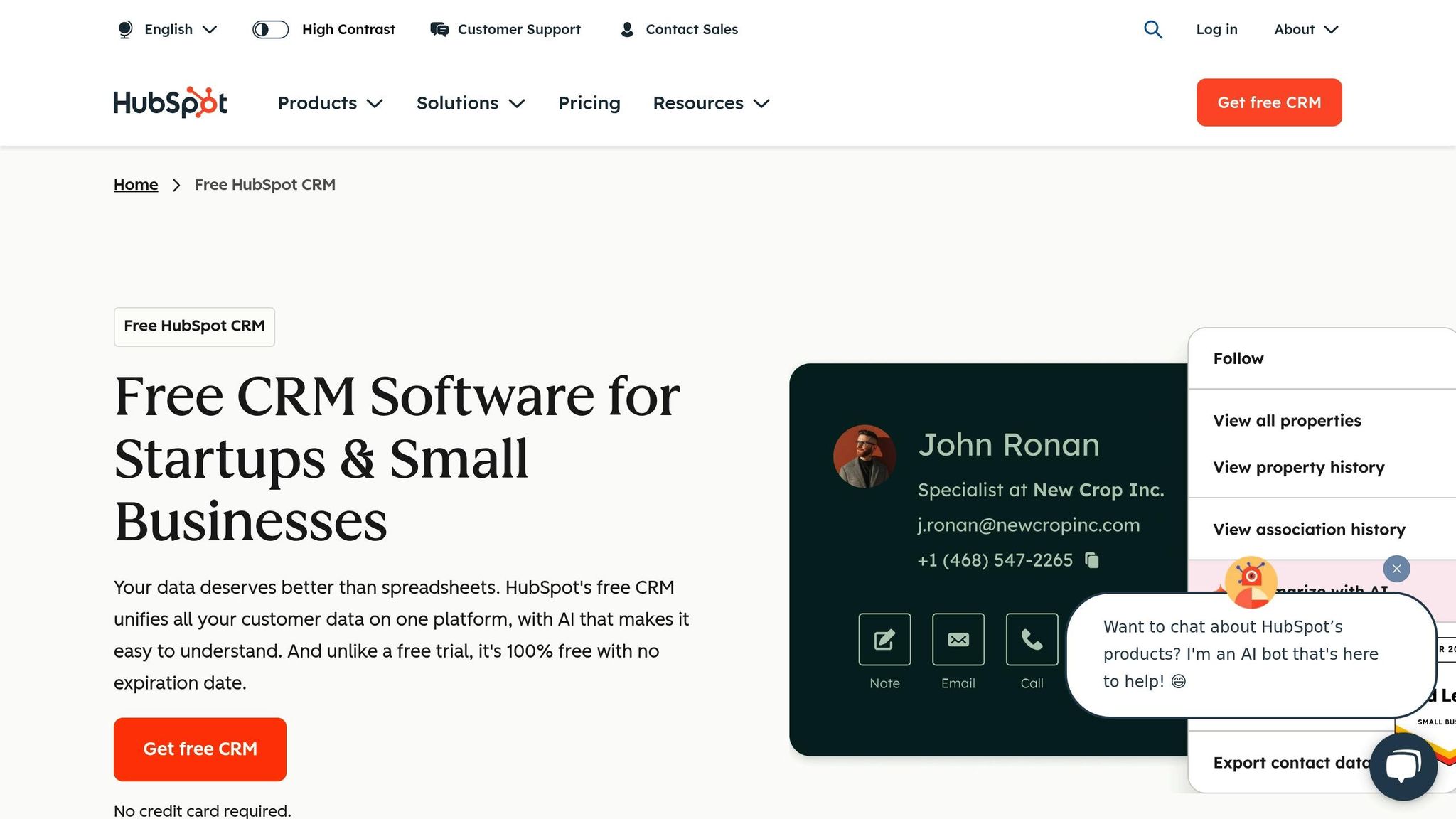
HubSpot Chatbot is another AI tool designed to simplify customer onboarding, offering seamless integration with HubSpot’s CRM and smart automation features. It helps businesses manage lead qualification, schedule meetings, and create support tickets – all while tracking customer interactions from the very first touchpoint.
With its no-code visual flow builder, teams can easily create playbooks to guide users through onboarding, route leads, and automatically schedule calls. Let’s explore how its features shape a personalized onboarding experience.
Onboarding Features
HubSpot Chatbot uses CRM data to tailor the onboarding process with conditional logic and quick replies, making it easier for users to find their way.
One standout capability is its proactive engagement based on user behavior. For instance, a G2 reviewer shared:
"We set it to proactively engage visitors who view pricing twice in a week – engagement rates shot up and our sales team loves the alerts".
The chatbot also updates contact details, creates deals, and enrolls users into automated workflows during conversations. Another G2 reviewer emphasized:
"The ability for chat flows to directly populate custom CRM properties and trigger workflows with almost zero manual mapping is a big differentiator from most other bots".
When a human touch is needed, the chatbot seamlessly transfers conversations to live agents through a shared team inbox, ensuring the chat history remains intact for smooth follow-ups.
Integrations
To support its personalized features, HubSpot Chatbot integrates directly with HubSpot’s CRM suite, including Marketing Hub, Sales Hub, and Service Hub. This allows the bot to access customer data and past interactions, providing relevant support throughout the onboarding process.
It also connects with third-party tools via workflows, webhooks, and custom integrations. Platforms like n8n.io make it possible to link HubSpot with other systems, expanding its capabilities. As noted by a TrustRadius reviewer:
"It routes intent-qualified leads instantly to correct pipelines based on conversation context… way more efficient than Zapier or native Slack bots I’ve used".
Support Channels
HubSpot Chatbot operates across multiple platforms, including websites and Facebook Messenger. Users can start a conversation on one channel and pick it up on another without losing context.
The bot provides 24/7 support by answering common onboarding questions instantly, while escalating more complicated issues to human agents. This round-the-clock availability ensures customers can resolve issues quickly, whether they’re setting up an account late at night or during regular business hours.
Pricing (USD)
HubSpot Chatbot pricing is tied to HubSpot CRM tiers:
– Starter: $20/month per seat
– Professional: $500/month
– Enterprise: $1,200/month
There are additional onboarding fees for specific hubs. For instance:
– Marketing Hub Professional: $3,000 (one-time)
– Sales and Service Professional Hubs: $1,500 each (one-time)
– Marketing Hub Enterprise: $7,000 (one-time)
– Sales and Service Enterprise Hubs: $3,500 each (one-time).
While the chatbot is available across all tiers, its more advanced onboarding features are best suited for teams using the Professional or Enterprise plans. It’s an excellent fit for businesses already embedded in the HubSpot ecosystem, where its features can be fully utilized.
10. Salesforce Einstein Bots
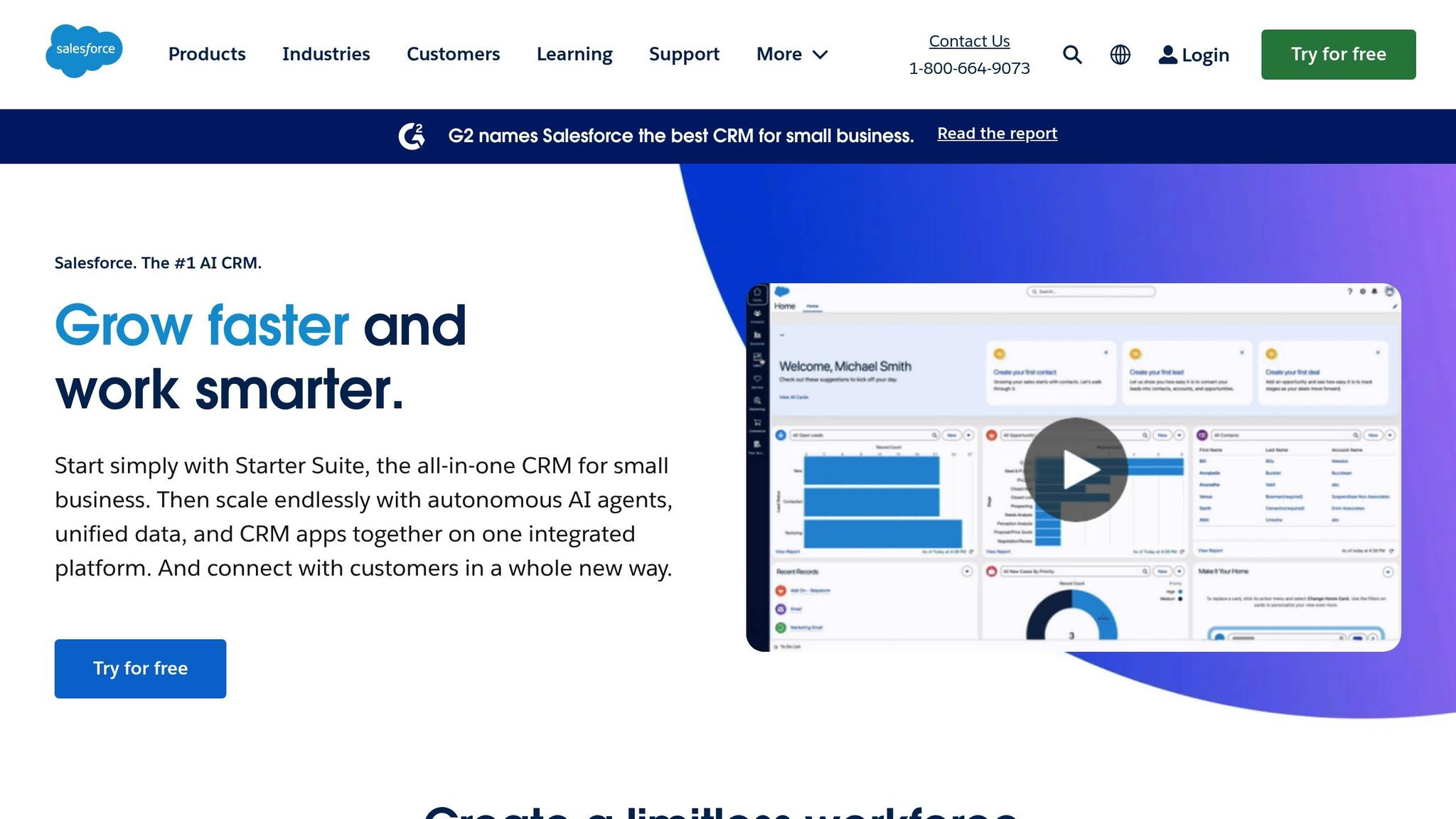
Salesforce Einstein Bots is a standout option for businesses already using Salesforce, turning customer data into tailored onboarding experiences. By leveraging existing CRM tools, it creates smart workflows that automate what were once manual processes, making onboarding more efficient and personalized.
Research highlights its ability to automate tasks, embody brand identity, and boost revenue through marketing and lead generation efforts. These features make it a strong choice for enterprises looking to streamline customer success automation. Let’s dive into how Einstein Bots enhances onboarding with smart workflows, integrations, and multi-channel support.
Onboarding Features
Einstein Bots simplifies onboarding by using customer data to create workflows that guide new users, open support cases, and update records seamlessly.
It’s designed to handle high volumes effectively. For instance, Gucci reported over 4,000 chats and a 30% increase in conversions after implementing Einstein Bots. Additionally, with the growing demand for digital assistance – 80% of consumers now expect it – the platform delivers. For industries with compliance needs, it integrates with third-party identity verification systems to manage Know Your Customer (KYC) requirements during onboarding.
Integrations
Einstein Bots integrates deeply with Salesforce products like Sales Cloud, Service Cloud, and Marketing Cloud, while also connecting to external platforms like websites, Facebook Messenger, WhatsApp, and Slack through its Channel Connector framework.
It also works with inventory management systems and other CRM platforms. By utilizing features like intents, knowledge articles, and Einstein’s AI capabilities, businesses can provide top-tier customer service while cutting costs. These integrations enable automated workflows that update records across systems, assign leads to sales teams, and initiate follow-ups, ensuring a smooth onboarding process.
Support Channels
Einstein Bots supports customers across multiple channels, allowing them to start onboarding on one platform and pick up where they left off on another without losing context. It’s available 24/7, catering to users who need assistance outside standard business hours.
For more complex issues, the bot seamlessly transfers conversations to live agents within the Salesforce system, retaining all the context. Customer surveys show that 62% of users prefer interacting with digital assistants over waiting for human agents, and 65% feel confident resolving issues without human intervention.
Pricing (USD)
Einstein Bots is included in Salesforce’s Digital Engagement plan, priced at $75 per user per month. This plan covers messaging, chats, and chatbot functionality. For businesses needing advanced AI features, Salesforce offers Agentforce add-ons starting at $125 per user per month, with Agentforce 1 Editions beginning at $550 per user per month.
Pricing is available across Sales, Service, Field Service, and Industries Clouds. Starting August 1, 2025, there will be a 6% price increase for Enterprise and Unlimited Editions. While the cost is on the higher side, Einstein Bots offers substantial advantages for organizations already invested in Salesforce.
Feature and Price Comparison
Selecting the right AI agent for customer onboarding depends on factors like your budget, technical setup, and integration needs. The table below outlines key details to help you identify the best option for your business.
| AI Agent | Starting Price (USD) | Best For | Key Onboarding Features | Top Integrations | Support Channels |
|---|---|---|---|---|---|
| Quidget | $16/month | Small to medium businesses | Ready-to-use onboarding templates, multilingual support (45+ languages), human handoff | Zendesk, Calendly, WhatsApp, Slack, Telegram | Website, mobile apps, messaging platforms |
| Intercom Fin | $0.99/resolution | Existing Intercom users | Conversation history integration, CRM data utilization | Salesforce, HubSpot, Shopify, Stripe | Web, mobile, email, social media |
| Drift | $2,500/month | Enterprise sales teams | Lead qualification, meeting scheduling, account-based marketing | Salesforce, Marketo, HubSpot, Microsoft Dynamics | Website, email, mobile |
| Ada | $1‑$3.50/ticket | Mid‑market to enterprise | Advanced analytics, multilingual support, compliance features | Zendesk, Salesforce, Shopify, Microsoft Teams | Web, mobile, social media, voice |
| Tidio | $0.50/conversation | Budget-conscious businesses | Live chat integration, email marketing automation | WordPress, Shopify, Wix, Facebook Messenger | Website, email, social media |
| Chatfuel | $15/month | Social media-focused businesses | Facebook/Instagram integration, broadcast messaging | Facebook, Instagram, Telegram, Zapier | Social media platforms, messaging apps |
| Lyro | $0.50/conversation | Small businesses needing quick setup | Automated inquiry resolution, 24/7 availability | Shopify, WordPress, Facebook, Instagram | Live chat, email, social media |
| Zendesk AI | $55/agent/month | Customer service teams | Ticket routing, knowledge base integration | Salesforce, Slack, Jira, Microsoft Teams | Email, chat, phone, social media |
| HubSpot Chatbot | $45/month | Marketing and sales alignment | Lead scoring, CRM integration, marketing automation | Gmail, Outlook, Salesforce, WordPress | Website, email, social media |
| Salesforce Einstein Bots | $75/user/month | Salesforce ecosystem users | CRM data integration, workflow automation, compliance support | Sales Cloud, Service Cloud, Marketing Cloud, WhatsApp | Multi‑channel with context retention |
Cost-Per-Resolution Analysis
Beyond pricing, cost efficiency varies widely across platforms. Quidget offers a low entry point at $16 per month, while Tidio’s Lyro is priced at $0.50 per conversation. Intercom Fin falls in the mid-range at $0.99 per resolution, and Ada ranges from $1 to $3.50 per ticket.
For businesses handling a high volume of inquiries, investing in conversational AI could be a smart move. Gartner estimates that by 2026, conversational AI could save $80 billion in contact center labor costs.
Integration and Setup Capabilities
When it comes to integrations, Salesforce Einstein Bots stands out with deep connections to the Salesforce ecosystem, including Sales Cloud, Service Cloud, and Marketing Cloud. HubSpot Chatbot is ideal for teams already using HubSpot tools, while Quidget provides versatile messaging support across platforms like WhatsApp, Slack, and Telegram.
Ease of setup is another key consideration. Platforms like Quidget and Tidio are straightforward to deploy, requiring minimal technical expertise. On the other hand, Salesforce Einstein Bots and Ada often demand IT support for implementation, and Drift may require some user training.
Performance Benchmarks
Real-world results highlight how these platforms perform. For example, Tidio’s Lyro can automatically handle up to 70% of customer inquiries across live chat, email, and social media. Similarly, WeightWatchers achieved a 70% resolution rate with Sierra AI, while Envoy’s Ema AI agent reduced support team workload by 70%–80%.
Language and Global Support
For businesses serving a diverse audience, multilingual capabilities are crucial. Quidget leads the pack with support for 45+ languages. Other enterprise solutions like Salesforce Einstein Bots and Ada also offer strong multilingual features, though smaller platforms may have limitations in this area.
Ultimately, your decision should align with your tech stack, budget, and onboarding goals. Quidget and Tidio are great choices for smaller businesses, while enterprises deeply integrated into ecosystems like Salesforce or HubSpot may find those platforms more suitable.
Conclusion
AI agents have reshaped customer onboarding, making it faster and more effective. Businesses adopting AI-driven onboarding solutions have reported a 200% increase in completion rates and an 85% boost in user retention. These results highlight that investing in AI is more than a cost-saving measure – it’s about delivering a smoother, more engaging customer experience.
Looking ahead, by 2028, 33% of enterprise software applications are expected to integrate AI agents, with the market projected to grow to $47.1 billion by 2030. Companies that hesitate to adopt these tools risk falling behind.
Selecting the right AI agent starts with understanding your unique business needs. Consider factors like company size, technical capabilities, and existing systems. Before committing, clearly define the problem you want to solve and identify the data your AI solution will require. Establish measurable KPIs, run a controlled pilot, and scale gradually based on results. This step-by-step approach reflects the efficiency that top AI agents bring to the table.
Curious to see how AI can transform your onboarding process? Quidget offers a 7-day free trial – no credit card needed. Quickly set up an AI agent, train it on your content, and let it handle up to 80% of routine customer questions. It’s a straightforward way to improve completion rates while cutting down support costs.
Try it today and experience the difference AI-powered onboarding can make.
FAQs
How do AI agents like Quidget make customer onboarding better than traditional methods?
AI agents, such as Quidget, are reshaping customer onboarding by offering real-time, personalized support while automating repetitive tasks. Traditional approaches often rely on manual data entry and one-size-fits-all workflows, but AI agents adjust to each customer’s unique behavior, making the process more intuitive and user-friendly.
These agents can tackle tasks like answering frequently asked questions, walking users through setup, and providing proactive tips. This ensures new customers feel guided and supported from the very beginning, which not only accelerates the onboarding process but also enhances satisfaction and boosts retention rates.
What should businesses look for when selecting an AI agent to automate customer onboarding?
When selecting an AI agent for automating customer onboarding, prioritize how easily it connects with your current tools, its user-friendliness, and its capability to manage detailed or challenging customer inquiries. Pricing and clear explanations of its features should also weigh into your decision.
It’s also worth considering whether the solution can scale alongside your business growth. Check if the vendor provides dependable support and if the AI can handle tasks like crafting tailored welcome experiences or assisting first-time users in a meaningful way.
Can AI agents handle more than just basic questions during customer onboarding?
AI tools excel at managing routine onboarding tasks, such as guiding users through account setup or explaining how to use specific features. With proper training and the right resources, they can even address more intricate questions. That said, for highly nuanced or sensitive matters, human agents remain indispensable for delivering top-tier support.


